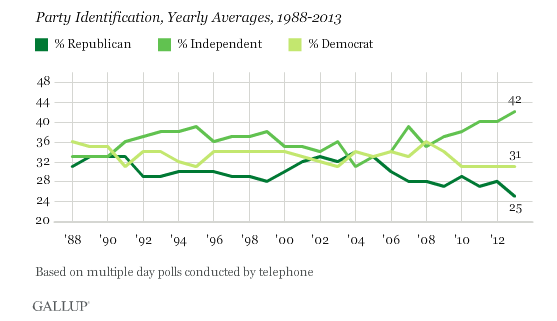The results of a new Gallup poll: “Forty-two percent of Americans, on average, identified as political independents in 2013, the highest Gallup has measured since it began conducting interviews by telephone 25 years ago. Meanwhile, Republican identification fell to 25%, the lowest over that time span. At 31%, Democratic identification is unchanged from the last four years but down from 36% in 2008.”
Real Clear Politics’ Adam O’Neal offers an explanation:
Two possible culprits for the shift away from party identification are the government shutdown in October and the disastrous rollout of the Affordable Care Act in the waning months of 2013. Only 37 percent of Americans identified as independents in the first quarter of 2013, but that number jumped to 46 percent in the fourth quarter.
The last quarter of 2013 was certainly a low point for partisan politics, and I suspect there was a big increase in Americans mumbling, “I’m an independent” at holiday gatherings to avoid arguments that might end in bloodshed. But the increased popularity of not picking a side has not produced any serious attempts at independent or third-party candidacies (that is, attempts that have raised serious money). One reason may be that increased partisanship in Washington does not necessarily lead to an ideological vacuum. On some issues, like same-sex marriage, there just isn’t a middle ground. And on others, such as raising the minimum wage, the Republican Party opposes any action at all, so any compromise position (a small increase) is de facto a Democratic position.
It’s also important to note that declaring independence is not the same as voting like an independent. Ticket-splitting has declined over the past three decades, in large part because the Democrats have largely stopped nominating candidates who usually vote with Republicans and vice versa. (Being independent was a lot easier when you could vote in people from different parties but still always vote for liberals or conservatives.) You can also tell that “swing” voting is down just by looking at how little county- and precinct-level maps change from one election to the next.
John Sides looks at the data and concludes that true independents are still a tiny slice of the electorate:
Independents who lean toward a party — or “independent leaners” — behave like partisans, on average. They tend to be loyal to their party’s candidate in elections. They tend to have favorable views of many political figures in their party. They are not much more likely to identify as ideologically moderate. To be sure, independent leaners are not as partisan as the strongest partisans. But they resemble weaker partisans much more than they do real independents. In actuality, real independents make up just over 10 percent of Americans, and a small fraction of Americans who actually vote.
Still, true independents, and those whose ideological views are out of whack with both parties, remain hopeful that we’re reaching a tipping point. At libertarian Reason magazine, Matt Welch writes that American politics is simply lagging behind American consumerism:
The economy/society-wide loss of brand loyalty and gain of individualized, tech-fueled disruption will hit politics and especially governance last, because of government's guaranteed revenue streams and party-rigged insulation from competition.
My guess is that this “insulation from competition” means that it’s still more likely for a centrist (maverick, iconoclast, take your pick) to crash one of the two major parties and steal a nomination than to win an election as a third option. But that reasoning is contingent on the parties acting in their long-term self-interest (by not trying to block such candidates), and things don’t always happen that way.








